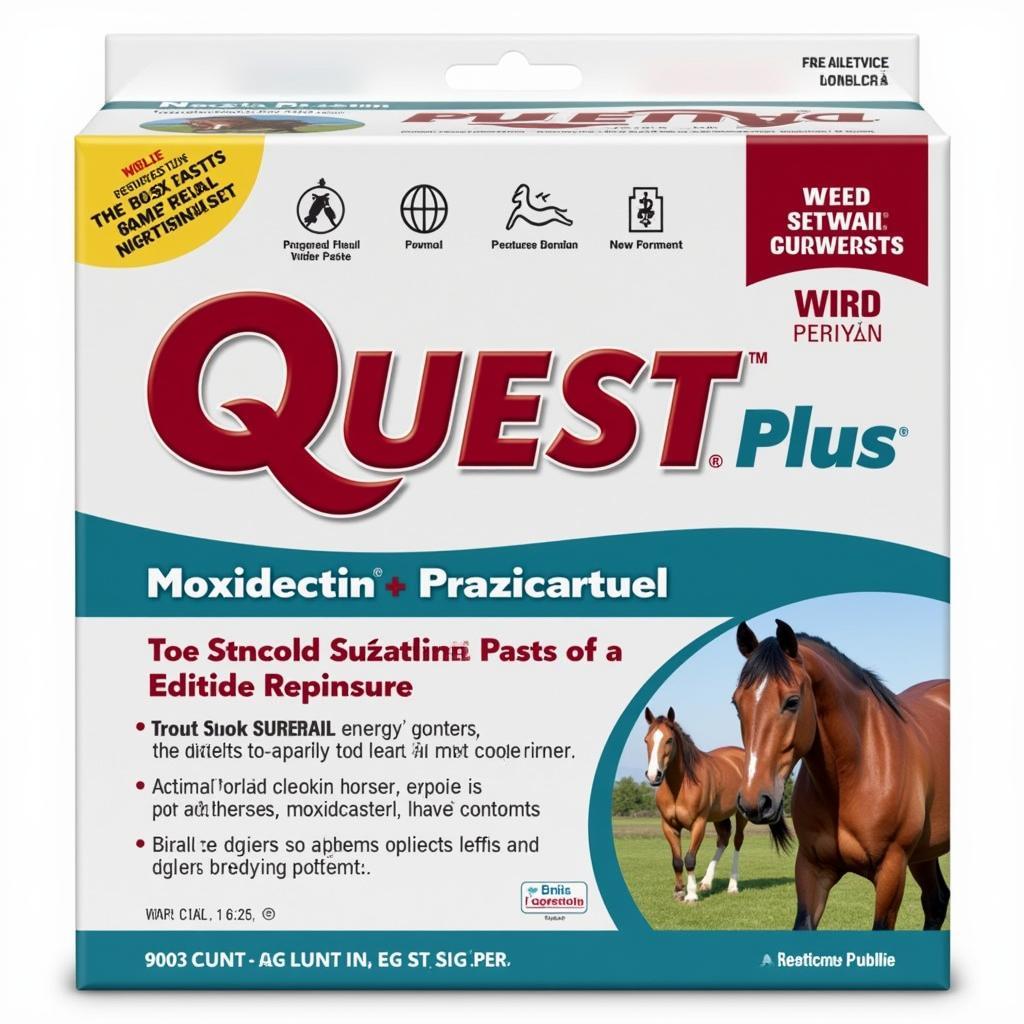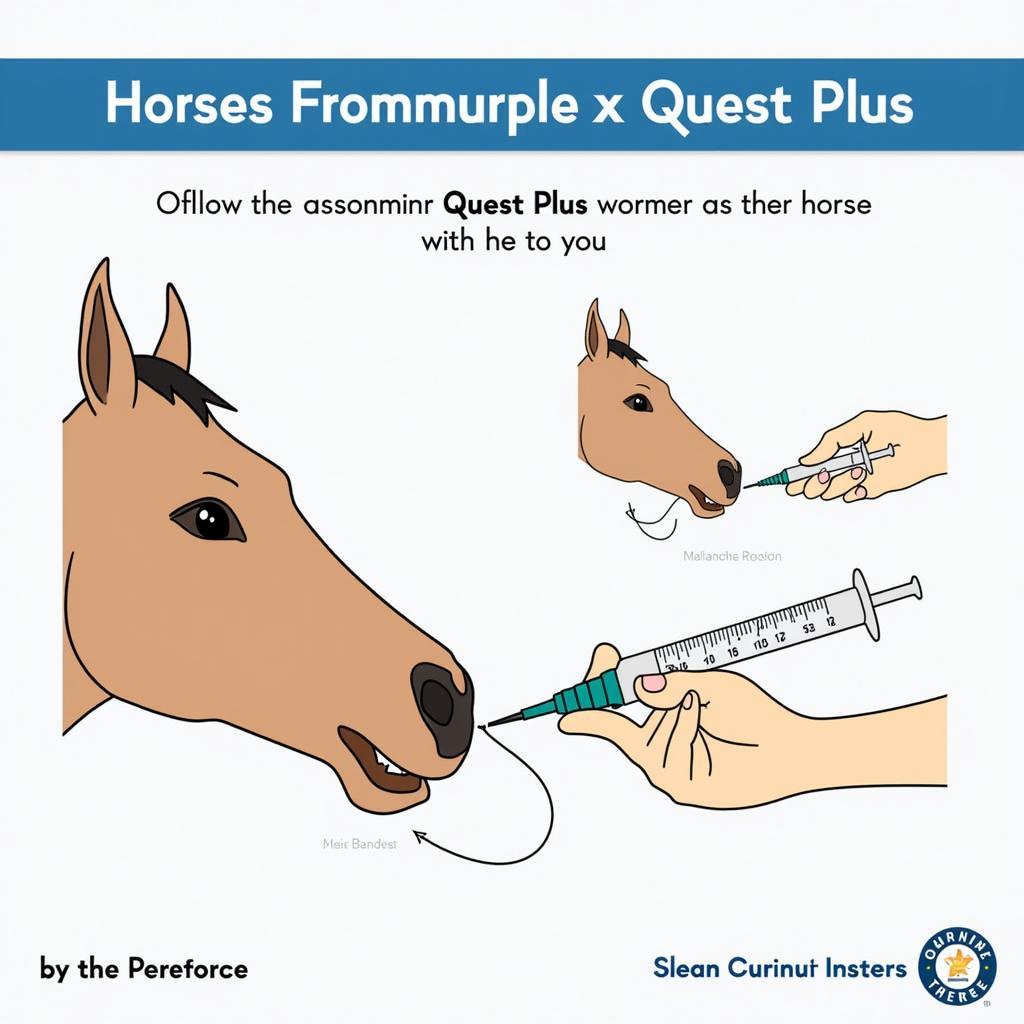Quest Plus Wormer For Horses is a broad-spectrum dewormer known for its effectiveness against a wide range of internal parasites. Understanding its usage, benefits, and potential side effects is crucial for every horse owner committed to their animal’s well-being. This guide provides in-depth information on Quest Plus, empowering you to make informed decisions regarding your horse’s parasite control program.
Understanding the Need for Deworming
Horses are susceptible to various internal parasites that can significantly impact their health and performance. These parasites, if left untreated, can lead to weight loss, colic, diarrhea, and other serious complications. A well-structured deworming program is essential for maintaining your horse’s overall health and vitality. Regular deworming with a product like Quest Plus wormer for horses is a proactive step towards protecting your equine companion. It’s crucial to consult with your veterinarian to develop a tailored deworming schedule based on your horse’s specific needs and environment.
What is Quest Plus Wormer for Horses?
Quest Plus contains moxidectin and praziquantel, two powerful active ingredients that target a broad spectrum of internal parasites. Moxidectin is effective against various worms, including bots, lungworms, and roundworms, while praziquantel targets tapeworms. This combination makes Quest Plus a comprehensive solution for controlling multiple parasite types with a single dose. The convenient paste formulation ensures easy administration and accurate dosing. Choosing the right dewormer is a critical aspect of horse ownership.
 Quest Plus Wormer for Horses Packaging
Quest Plus Wormer for Horses Packaging
How Does Quest Plus Work?
Moxidectin interferes with the parasite’s nervous system, causing paralysis and ultimately death. Praziquantel, on the other hand, disrupts the tapeworm’s tegument, its outer protective layer, leading to its expulsion from the horse’s digestive system. The combined action of these two ingredients provides comprehensive protection against a wide range of internal parasites. Understanding how Quest Plus works allows horse owners to appreciate its effectiveness and make informed decisions about their horse’s health.
Administering Quest Plus: A Step-by-Step Guide
Administering Quest Plus is straightforward, thanks to its paste formulation. Here’s a simple guide:
- Ensure your horse’s mouth is clear of any food or debris.
- Attach the provided syringe to the tube of Quest Plus paste.
- Set the dosage according to your veterinarian’s recommendations and your horse’s weight.
- Insert the syringe into the horse’s mouth, towards the back of the tongue, and depress the plunger to deposit the paste.
- Ensure the horse swallows the entire dose.
 Administering Quest Plus Wormer to a Horse
Administering Quest Plus Wormer to a Horse
Potential Side Effects and Precautions
While Quest Plus is generally safe, some horses may experience mild side effects such as temporary swelling at the injection site or slight lethargy. These are usually transient and resolve without intervention. However, it’s essential to monitor your horse after administering Quest Plus and consult your veterinarian if you observe any unusual symptoms. Always follow your veterinarian’s instructions regarding dosage and frequency of administration. Pregnant or lactating mares should only be treated under veterinary supervision.
Why Choose Quest Plus?
Quest Plus stands out due to its broad-spectrum activity, convenient administration, and proven efficacy. It offers a comprehensive solution for controlling a wide range of internal parasites, contributing significantly to the overall health and well-being of your horse. Choosing the right dewormer is a critical decision, and Quest Plus provides horse owners with a reliable and effective option.
“Quest Plus offers a broad spectrum of activity, making it a valuable tool in our equine parasite control programs,” says Dr. Emily Carter, DVM, Equine Specialist.
 Healthy Horse After Deworming
Healthy Horse After Deworming
Conclusion
Quest Plus wormer for horses provides a comprehensive and effective solution for controlling a broad range of internal parasites. Its dual-action formula, combined with its convenient paste formulation, makes it a popular choice among horse owners. By following your veterinarian’s recommendations and administering Quest Plus correctly, you can contribute significantly to your horse’s health and well-being. Remember to always consult with your veterinarian for personalized guidance and to establish a tailored deworming program for your horse.
FAQ
- How often should I deworm my horse with Quest Plus?
- What are the common signs of worm infestation in horses?
- Can I use Quest Plus on pregnant mares?
- Are there any specific storage instructions for Quest Plus?
- What should I do if my horse experiences side effects after receiving Quest Plus?
- How do I determine the correct dosage of Quest Plus for my horse?
- What other deworming products are available besides Quest Plus?
Common Scenarios and Questions
Scenario: My horse has recently lost weight and seems lethargic. Could this be due to worms?
Answer: Weight loss and lethargy can be symptoms of worm infestation. It’s crucial to consult your veterinarian for diagnosis and appropriate treatment.
Scenario: I’m unsure about the right deworming schedule for my horse.
Answer: Your veterinarian can help create a personalized deworming plan based on your horse’s age, environment, and individual needs.
Further Information and Resources
For more information on equine health and deworming, explore other articles on our website related to parasite control, horse nutrition, and general horse care. We also encourage you to contact us directly for personalized advice and support.
Need Assistance?
For any questions or concerns regarding Quest Plus or your horse’s health, please don’t hesitate to contact us.
Phone: 0772127271
Email: [email protected]
Address: QGM2+WX2, Vị Trung, Vị Thuỷ, Hậu Giang, Việt Nam.
Our dedicated customer support team is available 24/7 to assist you.